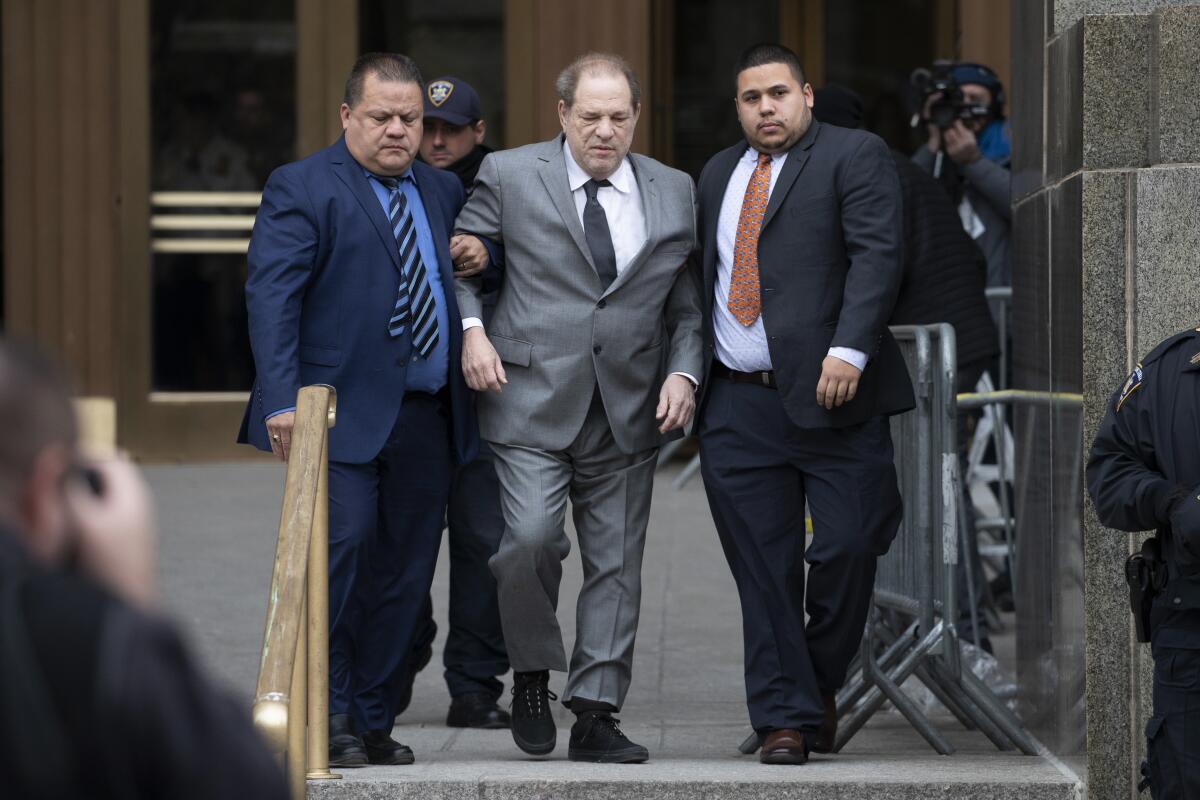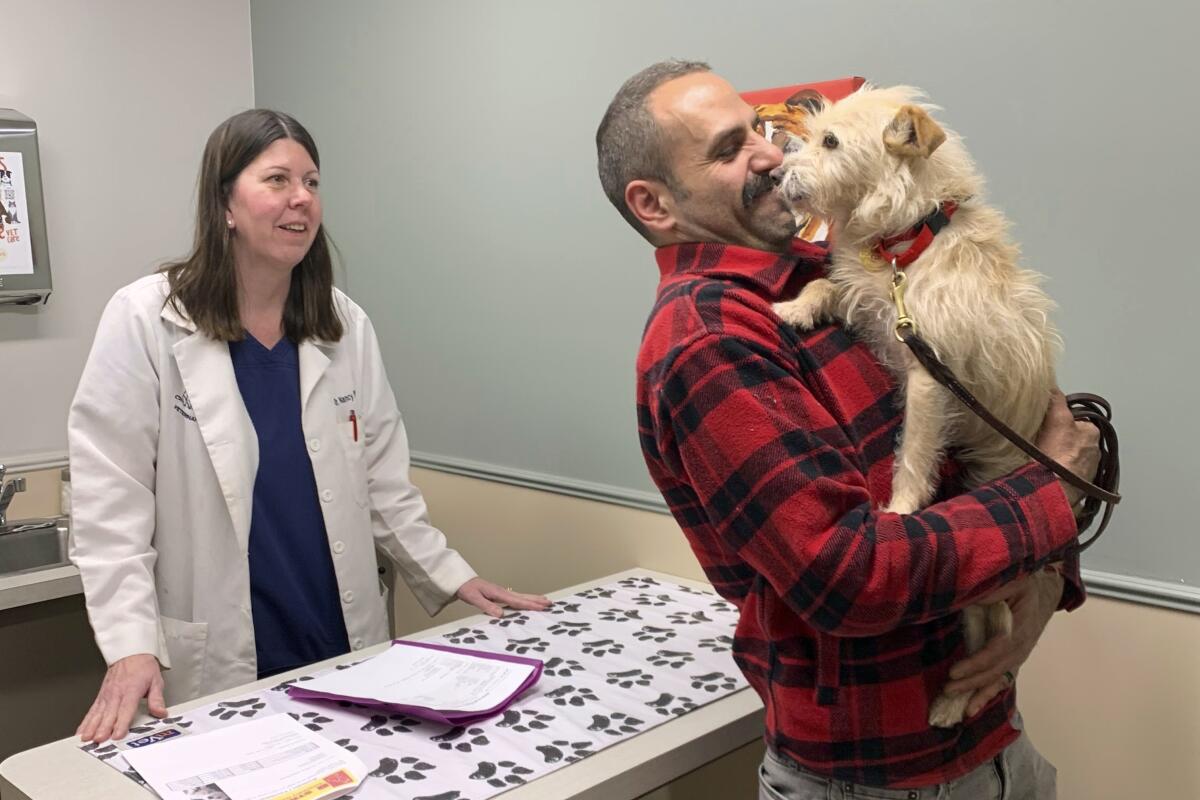This ain’t N.Y. and other reasons Harvey Weinstein won’t win in California court

- Share via
Hello and happy Tuesday. There are 188 days left until the election and I feel compelled to start this newsletter with a public service announcement: Don’t shoot your puppy.
Like, never. Not when you have some spare time before the kids get home from school, or when you’re near a gravel pit and it just feels right, or even because you call yourself a farmer and somehow believe that’s a farmer thing. It’s not.
If you have no idea what I’m talking about, good for you! But South Dakota Gov. Kristi Noem knows, because her political ambitions are now likely as dead as Cricket the dog.
Too much? Too soon? Anyway, this edition is dedicated to creeps, and their victims.
Which brings us to Harvey Weinstein.
Today we’re talking about a California Republican who went after former President Clinton for the Monica Lewinsky thing, but also happened to write a sex crimes law while he was a state assemblymember.
That V.I.L. (very important law) makes it likely that the only freebie the Golden State will be giving to Weinstein is lunch at the prison commissary.
You're reading the L.A. Times Politics newsletter
Anita Chabria and David Lauter bring insights into legislation, politics and policy from California and beyond. In your inbox three times per week.
You may occasionally receive promotional content from the Los Angeles Times.
How to make Clinton’s hit list
The Californian I’m talking about is Jim Rogan — not to be confused with New Jersey shock jock Joe Rogan, whom the Golden State declines to claim and who has nothing to do with this story.
Gentleman Jim, as no one but me has ever called him, is probably best known for his part in Clinton’s impeachment trial.
A day before the Lewinsky scandal broke, Rogan, then a Republican congressman, was appointed to fill a spot on the House Judiciary Committee made vacant by the death of Sonny Bono (a dear friend of Rogan’s), who had crashed into a tree while skiing. That led to Rogan being named a “house manager” for the impeachment — basically one of the prosecutors. Such is the capricious nature of history.
Rogan could have gotten out of it, he told me. Republican Speaker Newt Gingrich pulled him aside and let him know it was no hard feelings if he voted against impeachment.
Gingrich knew Rogan was from a district that included Glendale and Burbank, which was pretty liberal, and getting more so. Impeaching Clinton over what was widely seen as a private matter was not popular with those constituents.
But Rogan is kind of a stickler with the ethics stuff. It wasn’t the sex allegations that bothered him, but that Clinton had allegedly lied about it under oath and tried to cover it up, he said at the time.
Rogan believed that our standard should always be that “no person is above the law,” he told me.
“And yet this standard is not our inheritance automatically,” he said in his closing speech at the House trial. “Each generation of Americans ultimately has to make that decision for [themselves].”
That’s a pretty forward-thinking statement if you look where we are today with Donald Trump allegedly lying and hiding evidence, and us all here again trying to decide if it matters, or if presidents are immune to law.
But it did cost Rogan his political career. After Clinton was acquitted by the Senate, big-dollar Democratic donors including David Geffen (a Clinton supporter) lined up against Rogan.
They helped elect his challenger: Adam Schiff.
A history with sex crimes
Don’t cry for Jim. He’s fine. He went on to eventually become a judge, appointed by then-Gov. Arnold Schwarzenegger.
But it’s pre-Clinton Rogan we’re actually interested in today.
Before antagonizing Clinton, Rogan was a prosecutor for gang and sex crimes in Los Angeles. A while after that, he served in the state Assembly.
It was around 1995 when Rogan said he was listening to the radio, or the television, or maybe just remembering something he’d heard earlier.
A rapist somewhere back East was going to be released from prison and right there, talking to the reporter, the guy threatens the woman he raped. Something like, “‘I’ll be out in six months. We’ve got business to finish,’” Rogan recalled when I spoke with him this week.
The prosecutor in Rogan really hated that. Someone, he remembers thinking, ought to do something.
In his time going after child molesters and rapists, Rogan had been frustrated by how many crimes these perpetrators got away with because the victim was too traumatized to testify or it was a he-said-she-said in a system that rarely believed her, whoever she was.
One thing he learned was that where there was one victim in a sex crime willing to go to court, there were likely others whose cases couldn’t quite meet the legal standards, but who were clearly part of a pattern of behavior.
Judges would not allow those other victims to testify because California law at the time — like New York’s law today — gave only a general standard for when “prior bad acts” evidence could be introduced in any kind of crime. It made no exceptions for the special nature of sex crimes.

So Rogan made a new law. Just for sex crimes.
It is now known as Evidence Code 1108 and it reads in part:
In a criminal action in which the defendant is accused of a sexual offense, evidence of the defendant’s commission of another sexual offense or offenses is not made inadmissible.
Three little words that changed a lot — not everything — in California.
So, on behalf of all women and victims of sex crimes, bite that, Big Apple.
We’re 30 years ahead of you when it comes to handling sex crimes like the special circumstances they are — and that should be an embarrassment.
What will happen to Weinstein?
You’ve probably read that Weinstein’s New York conviction was overturned, with the appellate court citing as problematic that “prior bad acts” testimony from alleged victims whose claims did not lead to charges.
However, that acquittal doesn’t affect his California conviction by a Los Angeles jury in 2022.
That jury found him guilty on three counts — forcible rape, forcible oral copulation and penetration by foreign object. All of those counts were about his attack on one woman, Jane Doe No. 1, now known to be Evgeniya Chernyshova, a Russian model.
Without a doubt, Weinstein’s attorney’s will try to use the New York acquittal in his appeal here. But Chernyshova’s lawyer, David Ring, told me he is “not worried about the L.A. conviction at all.”
Ring told me that before the L.A. trial, he cautioned his client that “when all is said and done there is a very good chance that you might be the only victim in the United States that obtains a conviction against Harvey Weinstein.”
That’s in part because of 1108. There were always background murmurs that the “prior acts” testimony in New York could be attacked because its law is weak.
But the four women in California who testified to uncharged attacks by Weinstein — including California first spouse Jennifer Siebel Newsom — had their testimony examined by the judge prior to taking the stand, and that judge found it fell within the law for jurors to hear.
“The bottom line is this,” Ring said. “California has a much broader view of allowing that evidence in.”
Maggy Krell, a prosecutor for the California Department of Justice who specializes in human trafficking and who is currently running for the state Assembly, said 1108 evidence is common, standard and accepted in California courts.
“It’s used frequently and it’s well-settled law,” Krell told me.
Not all perfect in La La Land
But all that doesn’t make California a haven for victims of sex crimes. Krell points out we have a long way to go, and victims still face prejudice and skepticism.
She points out that human trafficking was only recently added as one of the crimes covered by 1108, and pimping still isn’t on the list.
But, though flawed, 1108 does this: It protects victims from the isolation that their attackers relied on to hide their crimes.
Krell says over and over, victims have told her they speak out so that others won’t have to go through what they did. But it’s lonely, and scary. When other victims come forward, even if their cases don’t lead to charges, it “helps that one survivor know that she is not alone.”
No matter where Weinstein lives out his final chapter, his victims have a solidarity that a court ruling can’t break.
What else you should be reading
The must-read: Surprise Tactics and Legal Threats: Inside R.F.K. Jr.’s Ballot Access Fight
The ‘Of course it’s the O.C.’ files : Many O.C. residents deny Trump election results, potentially swaying key races, poll finds
The L.A. Times Special: How treatment of miscarriages is upending the abortion debate
Stay Golden,
Anita Chabria
P.S. Here’s a happy puppy story
This is Mishka, a California dog. She wandered away from her dad’s San Diego auto shop nine months ago. A couple of weeks ago, she turned up in a suburb of Detroit, 2,000 miles away. Her dad, Mehrad Houman, was visiting family in Minnesota when he got the call she had been found. He drove 10 hours to pick her up.
He did not shoot her.
Honestly, that is going to be a punchline forever.

—
Was this newsletter forwarded to you? Sign up here to get it in your inbox.
Get the L.A. Times Politics newsletter
Deeply reported insights into legislation, politics and policy from Sacramento, Washington and beyond. In your inbox twice per week.
You may occasionally receive promotional content from the Los Angeles Times.




